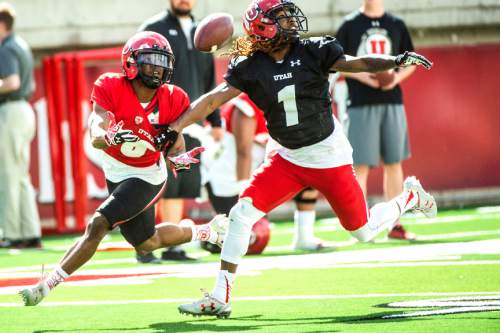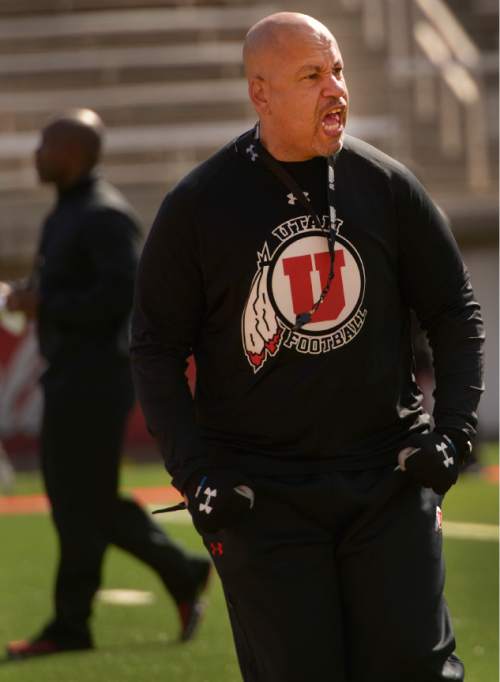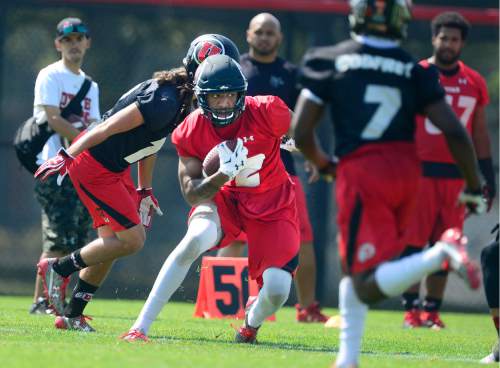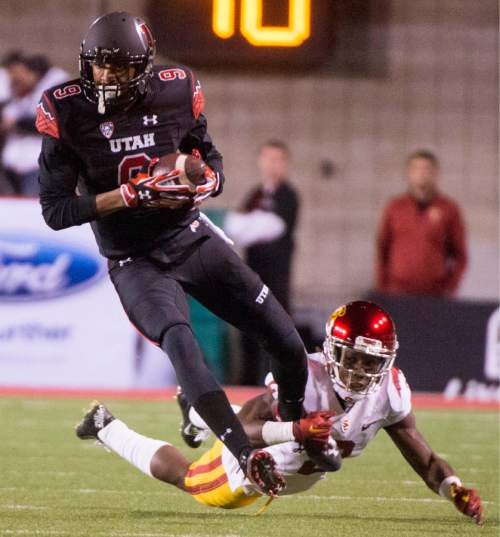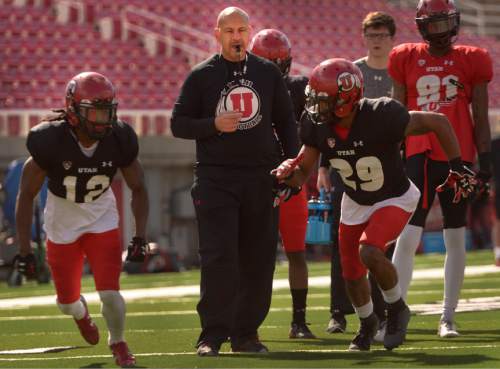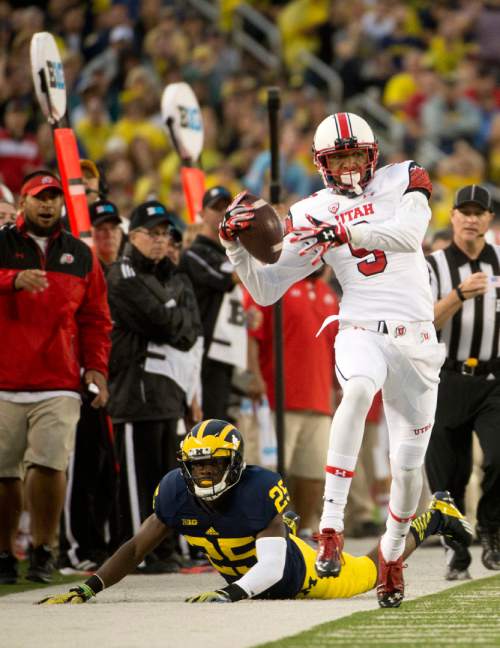This is an archived article that was published on sltrib.com in 2016, and information in the article may be outdated. It is provided only for personal research purposes and may not be reprinted.
The question after Utah practice the other day hung in the air like a blooping, wobbling Travis Wilson quacker, thrown weakly on the run and off the back foot: Are you, Kyle Whittingham, anti-pass?
He hesitated not one second: "I am not anti-pass. I'm anti-lose."
At first, that response sounded a little like a con man selling his product, banging around like the Wizard of Oz over in the corner, yelling, "Pay no attention to the man behind the curtain."
Here's why: If you can't pass in the Pac-12, you will lose, lose more than you should.
You must pay attention to the fact that over the past number of years the Utes' passing attack has, for lack of a less accurate, more sophisticated term, sucked. It has been the yawning hole in the Utes' football program since it joined a conference that requires adequate, if not explosive, offense. And despite steady growth everywhere else, the sagging-pass thing has gone on and on, hampering that progress. It's remarkable Utah has done as well as it has without that positive component.
Whittingham knows this. That's why he's stressed, again and again, at least verbally, that his team must improve in that regard.
After last season's loss to UCLA, Whittingham avoided the deficiency not one bit. He said: "It came down to a couple of things: 1) our inability to get much going in the throw game. We had 110 yards, which, uh, is not enough … and 2) not being able to score touchdowns in the red zone."
Those two problems were undeniably linked.
He went on: "We just couldn't get any separation. It's hard to throw the ball, to find somewhere to go with it, when nobody's open. We're getting bogged down in the throw game because we have a hard time separating."
Last season, the Utes finished second-to-last in passing offense, second-to-last in overall offense. Their quarterback ranked 10th in the league and none of their receivers were elite, none finishing among the top 12 in catches or receiving yards.
The other day, Whittingham underscored the point: "The receivers have to step up. We've got to be more productive in the throw game. That was our Achilles Heel last year. It's not just due to the receivers. Everybody plays a part — the quarterback, the offensive line, the play-calling. We have to get better at that."
While Whittingham dials in on who his new starting quarterback will be, the receivers, many of whom were with the team a year ago, are confident change is in the air, even with the punch to the face that is the indefinite loss of Cory Butler-Byrd. Those targets say they will not only help make the new QB look good, they will restore lost faith in a passing attack, they will make passes more than prayers.
To which, Whittingham, along with everyone else connected to the Utes, said and says hallelujah and amen. The coach wants to believe. His pattern of unwillingness to let the ball fly has come because he believed it would lead to more losing than winning.
Not anymore, said his receivers.
"I expect me and my team to step up and make big plays," said Kyle Fulks, the primary replacement for Butler-Byrd. "The receivers are looking good. Everyone's getting healthy and everyone's catching the ball. … Me, myself and a lot of guys are going to bring explosiveness to the field. The receivers are going to be fantastic this year. When we establish the pass, it will be a lot better for us, being balanced all around will help us win more games. We've got to be more balanced. We can't just put it on the run game. I'm real excited. I can't wait."
Tim Patrick, a highly regarded receiver who has not yet lived up to that regard, struggling with injuries, all but guaranteed the offense would be more potent: "Coach Whitt would say [being balanced is] 50-50, pass-run. But I'm saying 60-40 or maybe 70-30. … We have to be the playmakers on this team."
That kind of confidence is emanating from new receivers coach Guy Holliday, who has pushed his players hard since coming into the fold, and who is concurrently pumping the brakes on that self-assuredness and hitting the throttle: "Confidence comes with success and there hasn't been a tremendous amount of success here recently. We're laying the groundwork, saying, 'Hey, we can play at this level. We can be playmakers.' "
Said Patrick: "Coach Holliday is putting that in our heads. He's pushing us to be great."
According to Holliday, the Utes have no choice.
"In today's football, it's really important to balance the offense. You've got to have weapons, and I think we do have the weapons. We've got athletes. For us to take the next step, in my humble opinion, we do have to balance the thing. Then, you won't get eight guys in the box. It's important to get the ball down the field because big plays are what win games. We have to make them. We have to stretch the field and keep the defense off the ball. If you do, you win."
Whittingham, the anti-lose man, said he's on board with that vision. No, no, really.
"Whatever it takes to win," he said. "Am I a three-yards-and-a-cloud-of-dust guy? Not a chance. I'm a guy that wants to get the ball in the end zone, move the chains and whatever you can do to do that. We've got to make sure we're more balanced this year."
GORDON MONSON hosts "The Big Show" with Spence Checketts weekdays from 3-7 p.m. on 97.5 FM and 1280 AM The Zone. Twitter: @GordonMonson.


